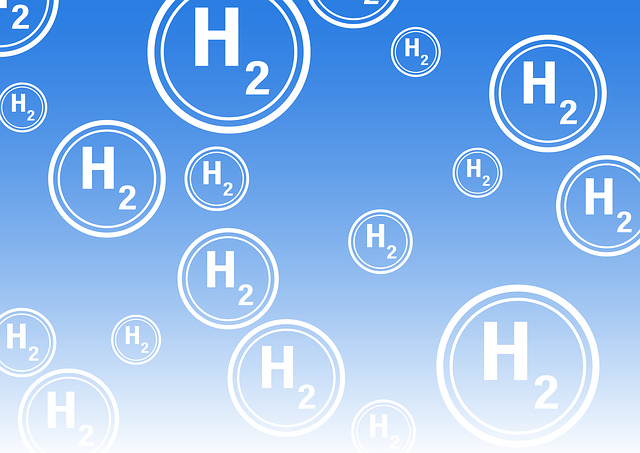Hydrogen is the lightest and most abundant element in the universe. It is found in stars, interstellar gas, and comets. In terms of its physical properties, hydrogen is a colorless, odorless, tasteless gas that is extremely flammable. It has the lowest melting point and boiling point of all elements.

Discovery of Hydrogen element
Table of Contents
Hydrogen gas was discovered by Henry Cavendish in 1766. He found that a sample of hydrogen gas exploded when it was brought near an open flame. Hydrogen gas was first prepared industrially by William Lefebvre in 1826.
Also read
Preparation of Hydrogen
There are three methods for the preparation of hydrogen – electrolysis of water, combustion of hydrocarbons and reaction of metals with acids.
Electrolysis of water
When an electric current is passed through water, hydrogen is formed at the negative electrode (cathode) and oxygen is formed at the positive electrode (anode). These gases are collected and used commercially. The equation for the electrolysis of water is –
2H2O → 2H2 + O2
From combustion of hydrocarbons
Hydrogen is obtained commercially by the combustion of hydrocarbons such as methane, petrol and kerosene. The equation for the combustion of methane is
CH4 → 2H2 + CO2
The equation for the combustion of petrol is –
C12H26 → 4H2 + 13CO2
The equation for the combustion of kerosene is
C15H32 → 5H2 + 16CO2
Reaction of metals with acids:
Metals react with acids to form hydrogen gas. The equations for some common reactions are given below:
Zn + H2SO4 → ZnSO4 + H2
Fe + H2SO4 → FeSO4 + H2
Cu + H2SO4 → CuSO4 + H2
Al + 3HCl → AlCl3 + 3H2
Physical properties of Hydrogen
Hydrogen is the lightest and simplest of all elements. It is a colorless, odorless gas that is very difficult to detect. Hydrogen is also the most abundant element in the universe. Boiling point of hydrogen is -253.14°C and its freezing point is -259.34°CSolid hydrogen has a melting point of 14.01K and a boiling point of 13.80K. Hydrogen is chemically very active element.
Chemical properties of Hydrogen
Hydrogen’s chemical behavior is similar to alkali metals, halogens etc. It forms the ion H+. In water it forms hydronium ions (H3O+). In nature, molecular form dominates but in laboratory other isotopes have been prepared as well such as 1H, 2H, 3H and 4He. The first three are stable while fourth one exists long enough to be detected only during cosmogenic process.
Hydrogen reacts with other elements to form compounds. If it reacts with non-metals, hydrogen will only form ionic compounds in which it gives away its electron to become H+. However, when hydrogen reacts with metals or metalloids, hydrogen forms covalent bonds because the electrons are delocalized in these kinds of elements.
Uses of Hydrogen
- Hydrogen is used in the manufacture of ammonia, sulfuric acid and other chemicals.
- It is also used to make hydrocarbons, which are important for the production of fuels and plastics.
- A small amount of hydrogen is used as a rocket fuel.
- Hydrogen can also be used to store energy from renewable sources like solar and wind power. When these sources are not available, the hydrogen can be converted back into electricity to power homes and businesses.
- Some research is being conducted on using hydrogen as a clean fuel for cars and trucks. Hydrogen fuel cells convert the chemical energy of hydrogen into electrical energy, which can be used to power vehicles.
FAQs about Hydrogen
1. Who discovered hydrogen?
The element Hydrogen was first isolated by Henry Cavendish in 1766.
2. How can hydrogen be prepared?
Hydrogen can be obtained from water or hydrocarbons, geological sources and electrolytic processes.
3. Name the important compounds of hydrogen?
Water (H2O), ammonia (NH3), methane (CH4) and methanol (CH3OH) are some examples of important compounds formed from the hydrogen atom.
4. Name all the physical properties of hydrogen gas?
-Lightest of all elements; colorless, odorless gas – Soluble in most organic liquids – Melts at -423° F (-253° C); boils at -434° F (-269° C); freezes at -452° F (-269° C).
5. How do you convert hydrogen gas to liquid?
-At atmospheric pressure, the temperature at which liquid hydrogen forms is -423 °F (-253 °C), but it can be converted into a liquid by applying an external pressure of 10 to 12 atmospheres between about -252 and -423 degrees Fahrenheit (between about -157 and 120 degrees Celsius) or by dropping the temperature below its normal boiling point.
6. What are the chemical properties of hydrogen atom?
Hydrogen reacts with nonmetals like halogens like fluorine, chlorine, bromine etc., to form ionic compounds in which it gives away its electron to become H+. However, when hydrogen reacts with metals or metalloids, it forms covalent bonds because the electrons are delocalized in these kinds of elements.
7. What is the most abundant element in the universe?
Hydrogen gas is the most abundant element in the universe. It makes up about 75% of all matter in the cosmos.